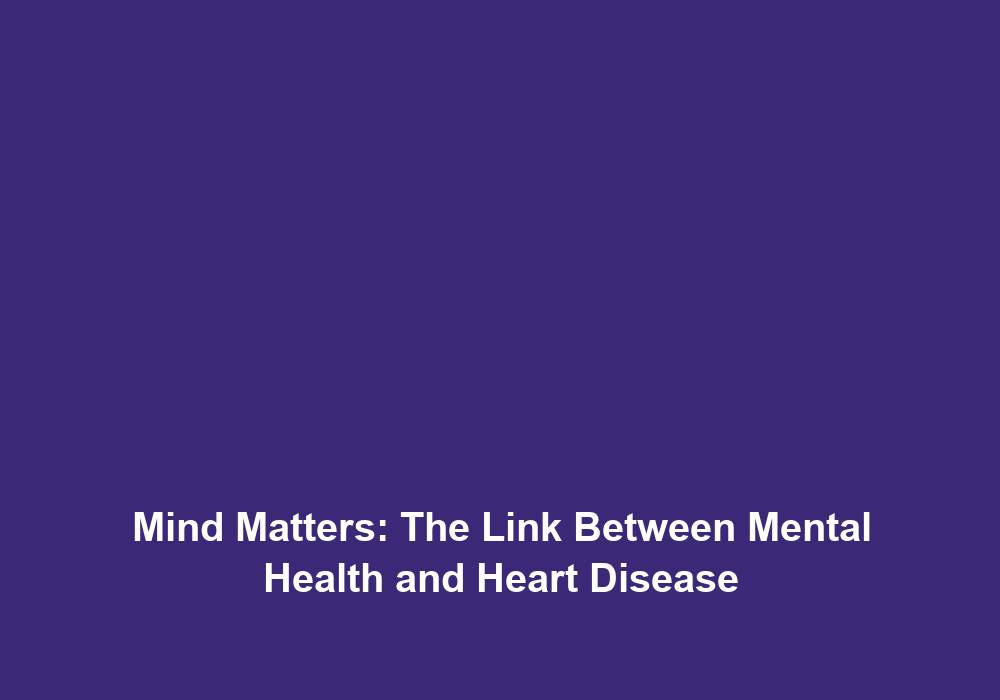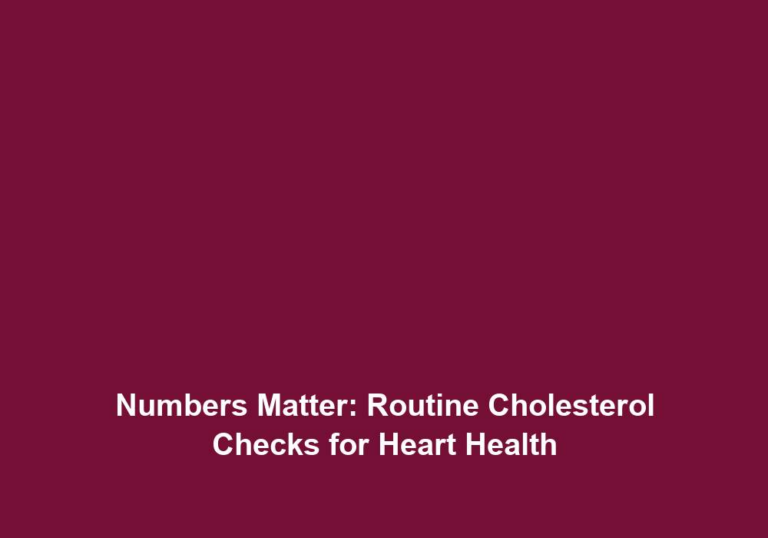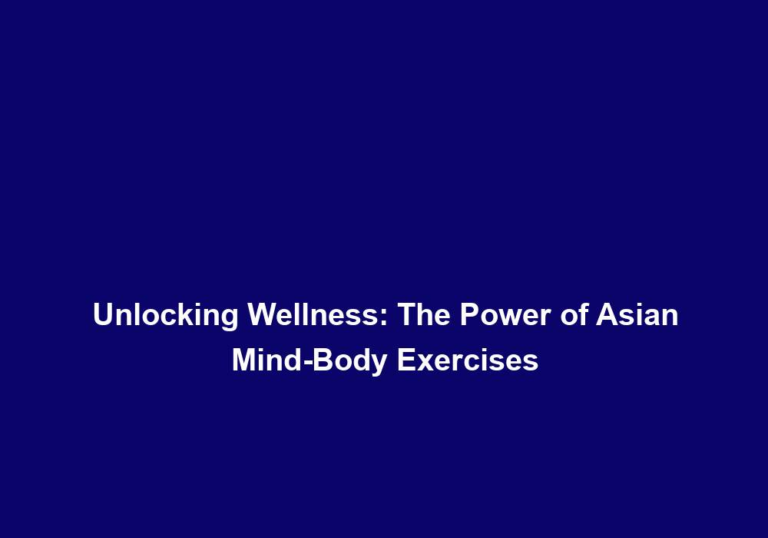Mind Matters: The Link Between Mental Health and Heart Disease
In our fast-paced modern world, mental health has become a crucial topic of discussion. It affects people of all ages, backgrounds, and walks of life. However, what many fail to realize is that the impact of mental health goes beyond the mind and can have significant effects on physical well-being as well. In recent years, research has uncovered a strong link between mental health and heart disease. This article explores the intricate connection between these two vital aspects of human well-being and emphasizes the importance of addressing mental health for the sake of cardiovascular health.
Introduction
In our fast-paced modern world, mental health has become a crucial topic of discussion. It affects people of all ages, backgrounds, and walks of life. However, what many fail to realize is that the impact of mental health goes beyond the mind and can have significant effects on physical well-being as well. In recent years, research has uncovered a strong link between mental health and heart disease. This article explores the intricate connection between these two vital aspects of human well-being and emphasizes the importance of addressing mental health for the sake of cardiovascular health.
Understanding the Mind-Heart Connection
-
The Prevalence of Mental Health Disorders: Mental health disorders, such as anxiety and depression, are increasingly common in society. According to the World Health Organization (WHO), more than 264 million people worldwide suffer from depression, and around 284 million experience anxiety disorders. These conditions can have a detrimental impact on one’s quality of life and overall health.
Mental health disorders are not limited to a specific demographic; they affect people from all walks of life. The prevalence of these disorders highlights the need for greater awareness and understanding. Depression, for example, can lead to feelings of hopelessness, loss of interest in activities, and difficulty concentrating. Anxiety disorders, on the other hand, can cause excessive worrying, restlessness, and irritability. These symptoms can significantly impact a person’s daily functioning and overall well-being.
It is important to note that mental health disorders are not just a matter of personal weakness or character flaws. They are legitimate medical conditions that require appropriate treatment and support. By recognizing the prevalence of these disorders, we can better understand the far-reaching effects they can have on an individual’s life.
-
The Burden of Heart Disease: Heart disease, including conditions like coronary artery disease, heart attacks, and strokes, is the leading cause of death globally. It is estimated that approximately 17.9 million people die from cardiovascular diseases each year. Recognizing the risk factors and addressing them promptly is crucial for preventing heart disease and promoting heart health.
Heart disease is a significant public health concern that affects individuals and communities worldwide. It is characterized by the narrowing or blockage of blood vessels, which can lead to serious complications, including heart attacks and strokes. Risk factors for heart disease include high blood pressure, high cholesterol levels, smoking, obesity, and a sedentary lifestyle.
It is important to note that heart disease is not solely a consequence of aging or genetics. Lifestyle factors play a significant role in its development and progression. By understanding the burden of heart disease and its associated risk factors, we can take proactive steps to prevent its occurrence and promote heart health.
The Bidirectional Relationship
-
Mental Health Impacting Heart Health:
-
Chronic Stress: Prolonged exposure to stress can lead to the release of hormones like cortisol, which can increase blood pressure and heart rate. Chronic stress also contributes to unhealthy coping mechanisms such as overeating, smoking, or excessive alcohol consumption, all of which pose a risk for cardiovascular health.
Chronic stress is a prevalent issue in today’s society, and its effects on both mental and physical health should not be underestimated. When faced with stressful situations, the body releases stress hormones, including cortisol, to prepare for a “fight or flight” response. While this response is essential in short-term situations, prolonged exposure to stress can have detrimental effects on the cardiovascular system.
High levels of cortisol in the body can lead to increased blood pressure and heart rate, which can strain the heart and blood vessels over time. Moreover, individuals experiencing chronic stress often turn to unhealthy coping mechanisms, such as overeating, smoking, or excessive alcohol consumption, which further contribute to the development of heart disease.
-
Psychological Factors: Mental health disorders often coexist with unhealthy behaviors such as physical inactivity, poor diet, and substance abuse. These factors can directly contribute to the development of heart disease.
Mental health disorders can significantly impact an individual’s lifestyle choices. For example, individuals with depression may experience a lack of motivation or interest in physical activities, leading to a sedentary lifestyle. Similarly, those with anxiety may turn to comfort foods or unhealthy eating habits as a way to cope with their symptoms.
Unhealthy behaviors, such as physical inactivity, poor diet, and substance abuse, are well-established risk factors for heart disease. These behaviors can contribute to conditions like obesity, high blood pressure, and high cholesterol levels, all of which increase the likelihood of developing cardiovascular problems.
-
Inflammation: Mental health disorders are associated with chronic inflammation in the body, which is believed to play a role in the development of atherosclerosis and other cardiovascular conditions.
Inflammation is a natural response of the immune system to injury or infection. However, chronic inflammation, which can occur in individuals with mental health disorders, has been linked to the development of various chronic conditions, including heart disease.
Inflammatory markers, such as C-reactive protein (CRP), have been found to be elevated in individuals with depression and anxiety. This chronic low-grade inflammation can contribute to the formation of plaques in the arteries, known as atherosclerosis, which can lead to heart attacks and strokes.
-
-
Heart Health Impacting Mental Health:
-
Reduced Oxygen Supply: When the heart’s ability to pump blood efficiently is compromised, less oxygen is delivered to the brain. This can result in cognitive impairments, mood disturbances, and even depression.
The heart plays a crucial role in delivering oxygen-rich blood to the brain. When the heart’s function is compromised, such as in the case of heart failure or reduced blood flow due to narrowed arteries, less oxygen is supplied to the brain. This reduced oxygen supply can lead to cognitive impairments, including difficulties with memory, concentration, and decision-making.
Additionally, inadequate oxygen supply to the brain can affect mood regulation, leading to mood disturbances and an increased risk of developing depression. It is important to recognize the impact of heart health on mental well-being and take steps to maintain optimal cardiovascular function.
-
Decreased Quality of Life: Living with heart disease can be challenging and may lead to feelings of anxiety, depression, and social isolation.
Heart disease can significantly impact a person’s quality of life. The physical limitations, lifestyle modifications, and potential complications associated with heart disease can lead to feelings of frustration, anxiety, and depression. Moreover, individuals with heart disease may experience social isolation due to their condition, leading to further psychological distress.
It is important to address the emotional and psychological well-being of individuals living with heart disease. Providing adequate support and resources can help improve their quality of life and overall mental health.
-
Side Effects of Medications: Some medications prescribed for heart conditions, such as beta-blockers, can have psychological side effects, including depression or fatigue.
Medications used to treat heart conditions can have psychological side effects that impact mental health. For example, beta-blockers, commonly prescribed to manage high blood pressure or heart rhythm problems, have been associated with symptoms of depression or fatigue in some individuals.
It is crucial for healthcare providers to monitor and address any psychological side effects of heart medications. Adjustments to medication regimens or additional support may be necessary to manage these symptoms effectively.
-
Strategies for Promoting Mental Health and Heart Health
-
Maintaining a Healthy Lifestyle:
-
Exercise Regularly: Engaging in physical activity helps release endorphins, which are natural mood boosters. It can also improve cardiovascular health and lower the risk of heart disease.
Regular exercise is beneficial for both mental and heart health. Physical activity releases endorphins, which are natural chemicals in the brain that promote feelings of well-being and happiness. Exercise also helps improve cardiovascular health by strengthening the heart and blood vessels, reducing the risk of heart disease.
Aim for at least 150 minutes of moderate-intensity aerobic exercise or 75 minutes of vigorous-intensity aerobic exercise per week. Incorporate activities you enjoy, such as walking, swimming, cycling, or dancing, into your routine to make it more enjoyable and sustainable.
-
Follow a Balanced Diet: Eating a diet rich in fruits, vegetables, whole grains, and lean proteins provides essential nutrients for both mental and heart health. Limiting processed foods, saturated fats, and added sugars is crucial.
A balanced diet is essential for maintaining optimal mental and heart health. Focus on consuming a variety of fruits, vegetables, whole grains, and lean proteins, as they provide important nutrients, vitamins, and minerals needed for overall well-being.
Limit the intake of processed foods, saturated fats, and added sugars, as they can contribute to inflammation, weight gain, and an increased risk of heart disease. Instead, opt for healthier options, such as whole foods, lean proteins, and heart-healthy fats found in sources like avocados, nuts, and olive oil.
-
Avoid Substance Abuse: Alcohol and drug abuse can negatively impact mental health and increase the risk of heart disease. Seeking help and adopting healthy coping mechanisms is essential for overall well-being.
Substance abuse, including excessive alcohol consumption and illicit drug use, can have detrimental effects on both mental and heart health. These substances can disrupt brain chemistry, leading to mood disorders and an increased risk of heart disease.
If you or someone you know is struggling with substance abuse, it is important to seek help from healthcare professionals or support groups. Adopting healthy coping mechanisms, such as engaging in therapy, practicing stress-management techniques, and building a strong support system, can contribute to overall well-being.
-
-
Managing Stress and Emotional Well-Being:
-
Practice Stress-Relief Techniques: Engaging in activities like meditation, yoga, deep breathing exercises, or mindfulness can help reduce stress levels and promote mental well-being.
Stress management is crucial for maintaining both mental and heart health. Engaging in stress-relief techniques, such as meditation, yoga, deep breathing exercises, or mindfulness, can help reduce stress levels and promote a sense of calm and well-being. These practices can also improve sleep quality, enhance focus and concentration, and foster emotional resilience.
Find activities that resonate with you and incorporate them into your daily routine. Experiment with different techniques to find what works best for you in managing stress and promoting emotional well-being.
-
Social Support: Building and maintaining strong relationships with family and friends can provide emotional support and help manage stress effectively.
Social support is essential for mental and heart health. Building and maintaining strong relationships with family, friends, and community members can provide a sense of belonging, emotional support, and a network of individuals to lean on during challenging times.
Make an effort to nurture your relationships, engage in meaningful conversations, and participate in activities that promote social connections. Remember that you are not alone, and seeking support from loved ones can significantly contribute to your overall well-being.
-
Seek Professional Help: If experiencing symptoms of anxiety or depression, it is vital to seek professional assistance from qualified mental health experts who can provide appropriate treatment and support.
If you are experiencing symptoms of anxiety or depression that persist for an extended period or significantly impact your daily functioning, it is important to seek professional help. Mental health experts, such as therapists, psychologists, or psychiatrists, can provide appropriate diagnosis, treatment, and support tailored to your individual needs.
Do not hesitate to reach out for help. Mental health professionals are trained to provide guidance, therapy, and medication if necessary, to help you manage your symptoms and improve your overall well-being.
-
Conclusion
The connection between mental health and heart disease is undeniable. By recognizing the bidirectional relationship between the mind and heart, we can take proactive steps to promote overall well-being. Prioritizing mental health through stress management, healthy lifestyle choices, and seeking professional help when needed can significantly reduce the risk of heart disease and improve the quality of life. Remember, taking care of your mind matters just as much as taking care of your heart.







